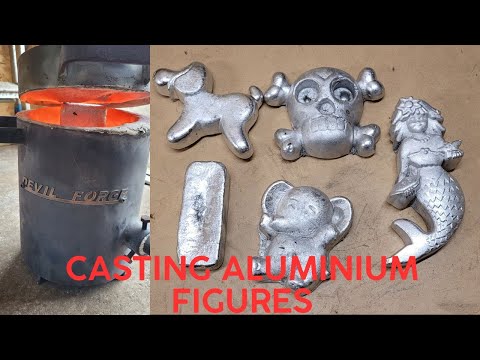Stahl Specialty Company Fundamentals Explained
Stahl Specialty Company Fundamentals Explained
Blog Article
Not known Facts About Stahl Specialty Company
Table of ContentsStahl Specialty Company for Beginners7 Easy Facts About Stahl Specialty Company DescribedThe Stahl Specialty Company IdeasSome Ideas on Stahl Specialty Company You Should KnowFascination About Stahl Specialty Company
The refined difference lies in the chemical web content. Chemical Contrast of Cast Light weight aluminum Alloys Silicon advertises castability by reducing the alloy's melting temperature and boosting fluidness during casting. It plays a crucial role in allowing elaborate mold and mildews to be loaded accurately. Additionally, silicon adds to the alloy's toughness and put on resistance, making it important in applications where durability is vital, such as automotive parts and engine elements.It also enhances the machinability of the alloy, making it much easier to refine right into finished items. This way, iron adds to the total workability of light weight aluminum alloys. Copper boosts electric conductivity, making it useful in electric applications. It also improves rust resistance and adds to the alloy's total strength.
Manganese adds to the toughness of light weight aluminum alloys and improves workability. It is commonly used in wrought light weight aluminum items like sheets, extrusions, and profiles. The existence of manganese aids in the alloy's formability and resistance to splitting during construction procedures. Magnesium is a light-weight element that provides stamina and impact resistance to light weight aluminum alloys.
It enables the production of lightweight parts with outstanding mechanical residential or commercial properties. Zinc boosts the castability of aluminum alloys and helps control the solidification process throughout casting. It enhances the alloy's stamina and firmness. It is usually found in applications where elaborate forms and fine information are essential, such as ornamental spreadings and certain automobile parts.
The Ultimate Guide To Stahl Specialty Company
Due to the fact that aluminum-silicon alloys have good casting residential or commercial properties, high gas homes, simple procedures, and superb corrosion resistance, aluminum-silicon alloys are most generally made use of in the die-casting sector at home and abroad. At the very same time, aluminum-silicon alloys are likewise fairly very early and widely identified alloys developed and utilized in die-casting. After constant research study and enhancement, a lot of the present worldwide mainstream aluminum-silicon alloys have actually been settled and are absolutely nothing greater than A356, A360, A380, ADC12, B390, and A413.
The primary thermal conductivity, tensile strength, yield strength, and elongation vary. Select ideal basic materials according to the performance of the target item created. Amongst the above alloys, A356 has the greatest thermal conductivity, and A380 and ADC12 have the cheapest. The tensile limitation is the opposite. A360 has the best return stamina and the highest prolongation price.

The 20-Second Trick For Stahl Specialty Company
In precision spreading, 6063 is well-suited for applications where detailed geometries and top notch surface area coatings are extremely important. Instances include telecommunication rooms, where the alloy's premium formability permits sleek and visually pleasing designs while preserving architectural integrity. Likewise, in the Lighting Solutions industry, precision-cast 6063 parts produce stylish and effective lights components that call for elaborate my website forms and great thermal performance.
(https://stahlspecialc.wordpress.com/2024/12/14/exploring-the-craft-of-aluminum-casting-inside-a-leading-foundry/)
The A360 displays exceptional elongation, making it suitable for facility and thin-walled elements. In precision casting applications, A360 is appropriate for industries such as Customer Electronics, Telecommunication, and Power Devices.

In precision casting, aluminum 413 radiates in the Customer Electronics and Power Devices markets. It's generally utilized to craft detailed parts like smartphone housings, camera bodies, and power tool casings. Its accuracy is impressive, with tight resistances approximately 0.01 mm, making sure flawless product assembly. This alloy's superior corrosion resistance makes it a superb selection for outdoor applications, guaranteeing durable, long lasting items in the stated industries.
How Stahl Specialty Company can Save You Time, Stress, and Money.
The aluminum alloy you select will significantly impact both the spreading process and the residential or commercial properties of the last item. Due to the fact that of this, you have to make your choice meticulously and take an informed strategy.
Figuring out the most appropriate aluminum alloy for your application will certainly suggest evaluating a large selection of features. The first category addresses alloy features that influence the production procedure.
The alloy you choose for die casting straight affects numerous aspects of the casting procedure, like just how easy the alloy is to deal with and if it is prone to casting defects. Warm breaking, likewise called solidification fracturing, is a common die casting problem for aluminum alloys that can result in internal or surface-level splits or cracks.
The Of Stahl Specialty Company
Certain aluminum alloys are a lot more susceptible to warm breaking than others, and your selection ought to consider this. An additional common defect found in the die spreading of light weight aluminum is die soldering, which is when the actors adheres to the die wall surfaces and makes ejection challenging. It can harm both the actors and the die, so you should look for alloys with high anti-soldering residential properties.
Rust resistance, which is already a noteworthy attribute of light weight aluminum, can differ substantially from alloy to alloy and is an essential particular to think about depending on the environmental problems your product will be exposed to. Use resistance is another property generally looked for in light weight aluminum items and can distinguish some alloys.
Report this page